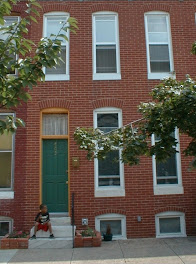By: Jessica Schmidt, Philanthropy Manager, NHS of Baltimore
Yesterday I walked into a store, and I was quickly reminded of what time of year it was…Back to School time, that time of year where kids cringe just thinking about homework and the loss of their summer freedoms. Ahh childhood, when it seems like the biggest ordeal was which trapper keeper to pick, what color folders to buy, and who to sit next to at lunch. As I walked through I couldn’t help but think about kids that are facing much harder, and more adult decisions because of the current economy. Instead of what lunchbox to get, they worry whether food will fill them, instead of who to sit by on the bus, they worry if they have a home for the bus to drop them off at.
The foreclosure crisis certainly has had a ripple effect in communities and the numbers are staggering, but what does foreclosure mean for a child and their educational future? According to the Pew Charitable Trusts report on the states response to the foreclosure crisis, 1 in 26 households in Maryland will face foreclosure over the next two years, and nationally nearly 3.3 million mortgages may default in 2007 and 2008. This means that 1.95 million children and youths are at high risk of losing their homes nationwide. In Maryland it is projected that 43,200 children will lose their homes as a direct result of foreclosure, according to a study done by First Focus.
Across the country schools are seeing a rapidly growing number of homeless children in their classrooms, and the effect to their education and behavior is starting to show. According to the National Assessment of Educational Progress, students with two or more school changes in the previous year are half as likely to be proficient in reading as their peers, and a government study found that mobile third grade students were nearly twice as likely to perform below grade level in math, compared to those who had not changed school. Students that have to move because of foreclosure are at a distinct disadvantage educationally, and without a stable home environment their education can continue to suffer. How can they study English if their family can’t pay the BGE bill? How can they learn math if they have to spend the night in a shelter? How can they build relationships when they are switching schools every few months? Researchers have found that school and residential changes can reduce the likelihood of graduation by more than 50%.
Educational issues aside, a lack of stable housing can also lead to behavioral and health issues. A study done by the General Accounting Office (GAO) found that frequent movers were 77% more likely to have four or more behavioral problems than their counterparts who have a stable home environment. Other studies have shown that attending multiple elementary schools increases the likelihood of violent behavior in high school by 20%. Children’s health are also at risk, families facing a critical burden of housing costs have less income to afford health insurance and prescriptions, as well as nutritional meals. The GAO study also stated that stable housing has been shown to correlate with other health outcomes, among them better nutrition, and healthy body weight. In the long run children that come from families that own their home are 59% more likely to become homeowners, their children are 25% more likely to graduate from high school, and they are 116% more likely to graduate from college.
That’s a lot of numbers I realize, but it is very alarming when you really start to think about the long term effects of the current economy. Saving a family’s home today can save a child’s educational future 10 years down the road and can make them better homeowners for their children. For some of us we may be able to move on from the “Forclousure Crisis” and forget about it in a year or two, but for some families the wounds run deeper and take much longer and a lot more help to heal.
Want to know how you can help a Baltimore family? E-mail me at jschmidt@nhsbaltimore.com.
skip to main |
skip to sidebar
+for+blog.jpg)
.JPG)
.jpg)
Baltimore boy enjoys the day on his front step

.JPG)
Potential homeowners attend our Homebuyer Education Class
.JPG)
Executive Director, Felix Torres Colon accepts governor's committment to excellence award

Board Chair, Ron Huffman helps seal the foundation of homeownership
Helping you endure these trying times by offering vital tips and information about homeownership and financial fitness.
FACING FORECLOSURE?
We can help. NHS of Baltimore is one of the leading foreclosure prevention nonprofits in the Baltimore region. We offer HUD certified counseling, loan modification mediation and refinancing. Get help today! 410-327-1200
NHS of Baltimore Website
Take our Homebuyer Education Class Online!
+for+blog.jpg)
- Neighborhood Housing Services of Baltimore Inc.
- For more information on our homebuyer education classes, foreclosure prevention, or to donate, please visit our website or call, 410-327-1200.
.jpg)
Baltimore boy enjoys the day on his front step

Potential homeowners attend our Homebuyer Education Class
Executive Director, Felix Torres Colon accepts governor's committment to excellence award
Board Chair, Ron Huffman helps seal the foundation of homeownership



